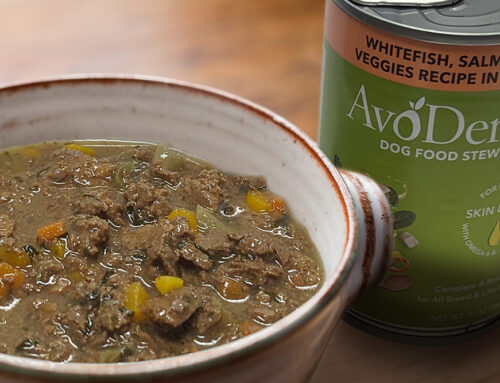If any food deserves the label “superfood,” it is the avocado. Packed full of vitamins, minerals and healthy fats, avocados are great, not just for people but also for dogs.
We enlisted the expertise of Portland holistic veterinarian Dr. Keith Weingardt to help us highlight four reasons why avocado makes a healthy, natural and safe addition to your dog’s diet.
1. Avocados are packed with protein
Avocados are extremely healthy sources of dietary proteins. In fact, they have more proteins and less sugar than any other fruit.1 The proteins provided are better absorbed by the body than beefsteak,2 and very low in cholesterol and sodium.3
Dogs need 20 amino acids to make the proteins necessary for their bodies to function; they make ten themselves, with the remainder provided in food sources. All of the remaining amino acids are found in avocados.4,5
High-quality proteins helps to build bodies, aiding in the maintenance and repair of cell, enzymes and hormones.6
“Protein is one of the most important nutrients in the canine diet,” say Dr. Weingardt. “The quality of the protein that is fed is also very important. Highly bioavailable protein from a whole food source is more efficiently utilized by the body for synthesis and repair. Avocado included in the diet provides an excellent whole food source of protein that is easily utilized by the body.”
2. Avocados are full of heart-healthy fats
Fats are essential to canine health, as they provide the main sources of energy and help to maintain a lean body. Avocados are high in monounsaturated fats, which are important for a dog’s skin. According to Dr. Weingardt, “signs of inadequate fats or consumption of poor-quality fats include a poor, dull or brittle hair coat, easily epilating hair and a tendency toward dermatitis — red, itchy rashes, or dry, flaky skin.”
The fats found in avocados also aid in the absorption of other nutrients, particularly carotenoids. Carotenoids are antioxidants that help protect cells from damage, support the cardiovascular system and boost immunity.7,8 Adding avocado to a meal containing sweet potato, carrots or leafy greens will help to increase your dog’s absorption of carotenoids by up to 600 percent.9 Avocado also aids in the conversion of specific carotenoids into vitamin A, which is needed for a healthy coat, skin and growth.9
“Healthy fats, like those found in avocado, provide the building blocks for maintenance of cells,” says Dr. Weingardt. “Healthy fats are also very important in the production of hormones. … An inadequate amount of fats or poor-quality fats can lead to immune system imbalances and perpetuate chronic disease.”
3. Avocados are highly nutritious
Avocados are nutrient-dense, containing 20 vitamins and minerals10 that are essential to the development and maintenance of a healthy body. According to Dr. Weingardt, “providing nutrient-dense foods in a dog’s diet helps to fill a lot of holes and gaps in the nutrient profile of processed pet food.”
Incorporating avocado into food is preferable over giving dogs synthetic vitamins and minerals that the canine body doesn’t recognize. “Providing nutrition from a whole-food source like avocado is much more vital for the pet,” Dr. Weingardt says. “The body appreciates receiving its nutrition in a natural, whole food form.”
Here are some of the most plentiful vitamins and minerals in avocados:
- Vitamin K: Creates blood-clotting agents in the liver. Signs of deficiency include increased blood-clotting time and hemorrhage.5
- Folate: Essential for the replication and growth of cells. Decreased folate is often found in anemic dogs, as well as dogs with chronic renal disease and hepatitis.11
- Vitamin C: Vital for keeping the immune system healthy and providing greater resistance to disease.12 It may also help to relieve sore joints in fast- growing puppies.13
- Potassium: Belongs to a group of blood minerals called electrolytes. These minerals assist with the conduction of electrical charges in the heart, muscles and nerves. If a dog lacks the proper amount of potassium, it will develop hypokalemia, which presents with symptoms such as vomiting, lethargy, weight loss, muscle pain and lack of appetite.14
- Vitamin B5: Necessary to synthesize proteins, fats and carbohydrates. Dogs that don’t have enough vitamin B5 lack energy, are fatigued and stressed.15
- Vitamin B6: Plays an important role in how amino acids, carbohydrates and fatty acids metabolize. Dogs with vitamin B6 deficiency can develop severe anemia, which can lead to death, especially in growing puppies. Clinical signs of a B6 deficiency include weight loss, decreased appetite and elevated plasma levels.16
- Vitamin E: Required for the function of the muscular, reproductive and nervous systems. Vitamin E also acts as an antioxidant, helping the performance of the immune system while regulating inflammation.17
4. Avocados are high in fiber
Fiber plays a vital role in the canine digestive system because it maintains the balance of healthy organisms that populate the digestive tract.18
“Avocado is an amazing prebiotic,” says Dr. Weingardt. “It is a substance that acts as a food source for the millions of bacteria that populate the intestine. A healthy balance of these beneficial bacteria – or probiotics – is essential for the health of the digestive system but, more importantly, to the overall immune system and general health of the patient.”
Avocados contain about 80 percent dietary fiber, 70 percent of which is insoluble.19 This insoluble fiber passes through the system untouched and plays a significant role in regulating body weight and aiding in digestion. The remaining 30 percent is soluble fiber. This fiber is broken down by bacteria within the large intestine, turning it into short-chain fatty acids which provide an energy source for the cells that are contained in the large intestine.20 In addition to avocados, other rich dietary sources of soluble fiber include rice bran, oats, barley, beet pulp and tomato pomace, which is the pulpy residue left after juicing. 21
It’s important to feed your dog meals packed with nutrient-rich foods. Providing a balance of high-quality proteins, essential fats and adequate fiber by incorporating avocado into his diet will keep him happy and healthy.
SOURCES:
- Dr. Axe, “Avocado Benefits: The Most Nutrition-packed Food on the Planet?,” n.d.
- Tara Green, Natural News, “
- Self Nutrition Data, “Nutrition Facts.”
- Claudia Kawczynska, The Bark, “
- Pet MD, “The Power of Protein,” n.d.
- American Society for the Prevention of Cruelty to Animals, “Dog Nutrition Tips,” n.d.
- Edward Group, Global Healing Center, “What Are Carotenoids? – 5 Health Benefits,” 2015.
- Jocelynn Jacobs, Countryside Animal Health Center, “Beta-Carotene: Boosting Your Dog’s Immune System,” n.d.
- The World’s Healthiest Foods, “Avocados,” n.d.
- Vet Book, “Folate Deficiency,” 2013.
- Anne Anyia, Watch Fit, “21 Amazing Benefits of Avocado: From Hormonal Balance to Weight Loss,” 2015.
- Karen Hedberg, Dogs NSW, “Nutrition,” n.d.
- Pet MD, “Low Blood Potassium in Dogs,” n.d.
- Raw to the Bones, “Complete Breakdown of Vitamin B5 (Pantothenic Acid) for Dogs,” 2014.
- DSM, “Vitamin B6,” n.d.
- DSM, “Vitamin E,” n.d.
- Nicola Ackerman, Vet Times, “Importance and Selection of Fibre in Companion Animal Diets,” 2014.
- Dreher, M. L., & Davenport, A. J. (2013). Hass Avocado Composition and Potential Health Effects. Critical Reviews in Food Science and Nutrition, 53(7), 738–750. de Godoy, M.R.C., Kerr, K.R. & Fahey, G.C. (2013). Alternative Dietary Fiber Sources in Companion Animal Nutrition. Nutrients, 5(8), 3099-3117.
- Jennifer Coates, Pet MD, “All Fiber is Not the Same,” 2015.





